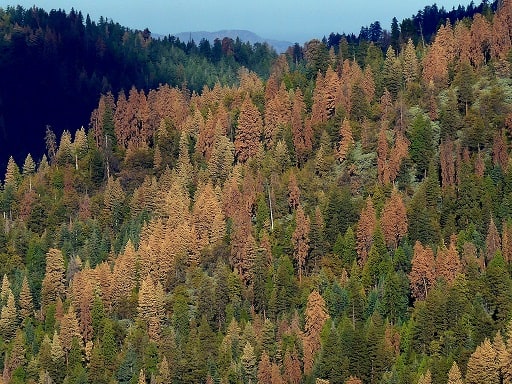
 Is there a way out of climate change by planting more trees?
Is there a way out of climate change by planting more trees?
Scientists at the University of Washington have identified a new piece of the global climate puzzle, one which shows just how interconnected we really are. In another version of the butterfly effect, the new study finds that forest die-offs on one side of the planet have significant ecological and weather impacts on the other side.
“When trees die in one place, it can be good or bad for plants elsewhere, because it causes changes in one place that can ricochet to shift climate in another place,” said lead author Elizabeth Garcia, a UW postdoctoral researcher in atmospheric sciences. “The atmosphere provides the connection.”
It’s called ecoclimate teleconnection -and, no, it’s not about mind-reading trees, although that would be cool. Teleconnection refers to the interrelatedness of weather systems across vast distances, often due to prevailing wind patterns and variations in atmospheric pressure. Weather patterns such as El Nino and the North Atlantic Oscillation (NAO) are prime examples where events in one part of the world, such as water temperatures in the South Pacific or low atmospheric pressure systems over Iceland, have a long-distance impact on other parts of the world: warmer winters in North America from El Nino versus cool and wet weather over much of Europe due to the NAO.
But so far, scientists have little understood teleconnection on an ecological level, in other words, how changes to the ecology in one area, such as a forest die-off, can impact weather patterns and ecological development in another area. In the new study, researchers used computer models to simulate the planet-wide effects of major reduction in forestland in two areas -western North America and the Amazon basin, both places where forests have been experiencing major declines -across western Canada and the United States, due to factors such as drought, heat and beetle infestation and in the Amazon primarily as a result of human development and deforestation.
The results were surprising. Researchers found that tree loss in western North America makes the southeastern U.S. drier, negatively impacting forest growth in places like the Carolinas, but it also has impacts further afield, such as producing cooler climates over Siberia and South America. Alternatively, losing forests in the Amazon turned out to have a positive effect on forest growth in nearby eastern South America but also caused Siberia’s climate to become colder and more barren.
“People have thought about how forest loss matters for an ecosystem, and maybe for local temperatures, but they haven’t thought about how that interacts with the global climate,” says study co-author Abigail Swann, a UW assistant professor of atmospheric sciences and of biology. “We are only starting to think about these larger-scale implications.”
The findings could be important for humankind’s attempts to avoid climate disaster, specifically in reference to proposed plans to alter conditions on a global scale through geoengineering. Theories abound for how to fix the Earth’s greenhouse gas problem, from adding iron to the oceans to putting up giant reflectors in the sky. And reforestation has also been proposed as a way to take in more carbon dioxide from the atmosphere, thus turning back the clock on the greenhouse effect.
But as the new results on teleconnection indicate, any geoengineering attempts are likely to involve a diversity of unintended consequences. Swann’s previous research argued that adding more forests to North America and Eurasia can actually result in warmer temperatures over some parts of the planet, along with changes in rainfall patterns and, potentially, a less productive Amazon basin. Said Swann in 2011, “We can’t plant our way out of the (climate) problem. The surest way to mitigate climate change is to reduce emissions directly, rather than trying to plant trees.”
Leave a Reply
You must be logged in to post a comment.




 Share
Share Tweet
Tweet Share
Share




Comment